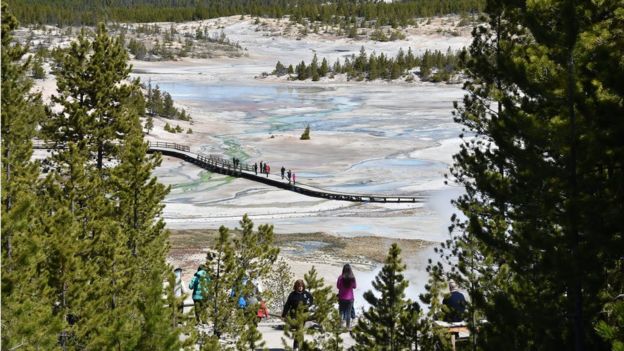Recriminations have begun over the failure of the US Senate to pass a new budget and prevent the shutdown of many federal services.
A bill to fund the federal government for the coming weeks did not receive the required 60 votes by the deadline of midnight on Friday.
President Trump accused the Democrats of putting politics above the interests of the American people.
The Democrats blame him for rejecting bipartisan compromise proposals.
Both the Republican and Democrat congressional leaders say they will keep talking, and the White House budget chief has expressed optimism that a resolution will be found soon.
But hundreds of thousands of federal workers are facing the prospect of no work and shuttered offices on Monday morning.
The last government shutdown was in 2013, and lasted for 16 days.
Why can the two sides not agree?
This is the first time a government shutdown has happened while one party, the Republicans, controls both Congress and the White House.
But they do not have enough seats in Congress to pass major legislation without at least some support from the Democrats.
The Republicans want funding for border security - including the border wall - and immigration reforms, as well as increased military spending.
The Democrats have demanded protection from deportation of more than 700,000 undocumented immigrants who entered the US as children.
The Republicans added a sweetener to the bill in the form of a six-year extension to a health insurance programme for children in lower-income families. But Democrats want this programme extended permanently.
Mr Trump accused the Democrats of being "far more concerned with illegal immigrants than they are with our great military or safety at our dangerous southern border".
But the leading Senate Democrat, Chuck Schumer, blamed the president, saying Mr Trump had turned down two bipartisan compromise deals and "did not press his party in Congress".
This could be a protracted, ugly fight
Anthony Zurcher, BBC News, Washington
The game of chicken ended with a head-on crash.
Republicans are anxious to label this the "Schumer shutdown" and, essentially, they're right. Chuck Schumer and his fellow Democrats (with the help of a few Republicans) blocked a bill that would have kept the government open - at least temporarily.
Determining responsibility and apportioning blame, however, are two decidedly different endeavours.
Democrats will argue that they had a deal with the president on their bipartisan compromise that included immigration reform - only to have him back away during that fateful obscenity-laden Oval Office meeting last week. Republicans will frame this as liberals putting undocumented immigrant protections over military readiness and health insurance for poor kids.
The blame game began at midnight, and the winner has yet to be decided. Generally, the loser in these types of showdowns is the party entering the fight with the lowest popularity - bad news for Mr Trump and the Republicans.
The good news, for both sides, is that their political bases will be thrilled they are playing hardball. Midterm election years, like 2018, tend to encourage this kind of rally-the-base manoeuvres.
Now that the line has been crossed, this could become a protracted, ugly fight.
What is a government shutdown?
The US budget must be approved by 1 October - the start of the federal financial year.
But Congress has often failed to meet this deadline and negotiations continue well into the new year, with the previous year's funding to federal agencies extended on a temporary basis.
Because Congress failed to agree an extension that would have maintained government funding through to 16 February, it means many federal agencies effectively closed for business as of 00:01 Saturday (05:01 GMT).
Most staff in the departments of housing, environment, education and commerce will be staying at home on Monday. Half of workers in the treasury, health, defence and transportation departments will also not be going to work.
National parks and monuments could face closure, which provoked an angry public reaction during the 2013 shutdown.
Visa and passport processing could also be delayed.
But essential services that protect "life or human property" will continue, including national security, postal services, air traffic control, inpatient medical services, emergency outpatient medicine, disaster assistance, prisons, taxation and electricity generation.
The shutdown began on the first anniversary of President Trump's inauguration. He has delayed a trip to his Florida resort where he is due to host a party - with attendees paying as much as $250,000 (£180,000; €204,500) - to mark the event.
What happened during the 2013 shutdown?
Many federal employees were forced to take a leave of absence - officially known as being furloughed - during the 16 days of shutdown.
At its peak, some 850,000 employees were off work each day. It cost the government $2bn in lost productivity and led to "significant negative effects on the economy", the OMB said at the time.
"The problems start from the top and have to get solved from the top," he said. "The president is the leader, and he's got to get everybody in a room and he's got to lead."
 |
| National parks and monuments are facing closure |
Source: BBCNews


No comments:
Post a Comment
Add a Comment...